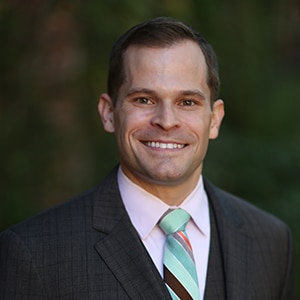Applying for work? Don’t take your friend’s advice
What might be the perfect job for your friends could be the wrong fit for you, according to new research from the University of Florida.
Who would you rather go on a blind date with: someone you don’t know or someone recommended by a friend? The same is true when applicants are applying for jobs; according to new research by Beth Ayers McCague Family Fellowship Associate Professor Brian Swider at the University of Florida Warrington College of Business, applicants are more attracted to and willing to take jobs with a company their friends feel are a great fit.
Walking into a career fair is different than picking up a date – you’re still dressed up and sweating, but typically you won’t bring a resume when being interviewed by a potential partner. The elevated stakes might be why students take on career fairs in packs, opting to perform their elevator pitches alongside a classmate as they introduce themselves to recruiter after recruiter.
It’s a functional method, Swider says, but a faulty one. What follows a team of classmates taking on a career fair is a classic case of social information processing.

Beth Ayers McCague Faculty Fellow Brian Swider.
“The study identifies that how applicants go through the recruitment process is meaningfully impacted by what their friends think about those organizations,” Swider explained. “That can be positive in the form of learning. But that can also be negative in the form of social influence and pressure to conform to what your friend group thinks about a certain organization.”
Throughout the interview process, it’s inevitable that friends will swap notes about the different companies they’ve met, offering opinions and advice. However, one student’s experience may not be applicable to their friend, and the resulting bias could be damaging.
To assess this dilemma, Swider and his co-author, David Sullivan, studied two cohorts of students from professional accounting programs in the Southwestern United States. The students all received job offers from major accounting companies, and Swider watched in real time as the cohorts indirectly pressured their peers into accepting positions at certain companies.
“We’re cognitive misers – that’s ultimately where biases creep in,” Swider said. “These decisions are tough, and sometimes we over-rely on others because we don’t want that responsibility. If I can trick myself into saying I have enough information, then at least I can live with the decision in the short term.”
It can be helpful to get input and learn from the people who know us best, Swider says, but when accepting a job offer it’s important to make a decision that is right for you, not for your friend. Swider offers some practical examples of how to filter through peer pressure and find your perfect match:
- Make a list of pros and cons
- Analyze your strengths and weaknesses and compare those with the job’s description
- Identify alignment between personal and company values
- Seek alternative information sources to diversify your perspective
“We spend 40% of our waking adult lives at work,” Swider emphasized. “Making sure that individuals and organizations are finding the right match has a net positive for everyone involved in that slice of life. If you can get people in organizations that fit, all the data suggests positive outcomes for both the employee and the employer.”
Applicants can benefit from Swider’s research, and so can their recruiters. Rather than sticking with outdated practices, recruiters can offer better information sources about their company and even adapt their hiring strategies by creating opportunities to recruit friend groups or cohorts that are already accustomed to working as a team.
“A lot of employee withdrawal and turnover can be traced back to inefficient or ineffective recruitment and selection processes,” Swider said. “If you’re bringing in the wrong people, or the people who are attracted to your organization are attracted for the wrong reasons, it’s not functional for anybody. The employee is going to be dissatisfied, disengaged and eventually they’re going to quit and have to spend time, resources, money [and] effort to find new jobs.
“The organizations will have to go out and re-recruit, reselect, resocialize and hope they do better in the future.”
If recruiters can optimize their onboarding strategies, and applicants make decisions based on their own judgements instead of being swayed by their friends’ opinions, then they’ll have a better chance of launching a relationship that could last a lifetime.
“There are a bunch of people taking jobs because their friends are doing it, and I learned very early in life that if all your friends are doing something, it doesn’t necessarily mean it’s a good idea.”




